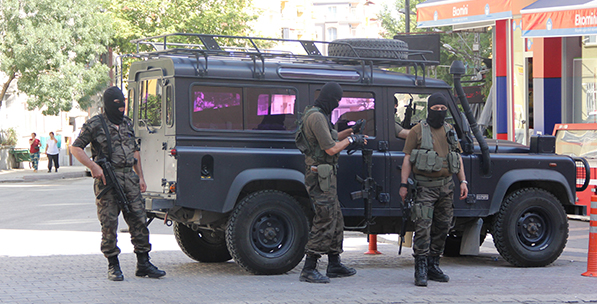Turkey was shaken by a bloody terror attack at the beginning of the week. In Suruç, near the border with Syria, a suicide bomber blew himself up, and 32 people lost their lives. Prime Minister Ahmet Davutoğlu announced that according to the initial evidence, ISIS was responsible for the terror attack.
This attack happened in the days when the PKK began making calls for armed action against the Turkish government and announced that it had ended the two-year-long ceasefire.
At first glance, this terror attack can be read as splatter from the battle between ISIS and the PYD, the PKK's Syrian arm, because while the attack occurred on Turkish soil, it specifically targeted people who had a political outlook in line with the PKK. The bomb exploded during a press conference by the Federation of Socialist Youth Associations, where 300 people had gathered before setting off for Kobani.
Kobani has been used as a political utopia by the PKK and its political arm, the Peoples' Democratic Party (HDP), for almost a year-and-a-half in Turkish politics. The PKK's supportive protests on behalf of Kobani caused conflicts to flare up last October, causing the deaths of 50 civilians. Since then, the PKK and the HDP have increasingly acted in accordance with the Democratic Union Party's (PYD) positions, opportunities and dilemmas in the Syrian civil war. During this process, the PKK risked the reconciliation process it had been involved in with the Turkish government and brought the front line of its battle in Syria into Turkey. While doing this, the PKK demonstrated a radical opposition to the Turkish government and the Justice and Development Party (AK Party) administration.
The PKK blamed its 30-year-long armed conflict against the Turkish government, on discriminatory policies against Kurds in societal, political, economic, and cultural areas. The AK Party administration has taken steps since 2005 to remove discrimination against Kurds and apologized for the government's past militaristıc and security-oriented policies.
Throughout this period, the PKK lost its armed conflict base, and organization leader Abdullah Öcalan announced in 2013 that the armed conflict against the government would be finished and that armed militants would pull back outside of Turkey's borders. However, after the Gezi protests in Turkey and with the PYD gaining the opportunity to carve itself an autonomous area due to the Syrian civil war, the PKK abandoned its disarmament. While doing this, it brought new excuses to the government. In May 2013, the PKK demanded that the reconciliation process being given "legal assurance." In response, the AK Party administration enacted a law in 2014, and a new structure was created, with cabinet approval, called the Reconciliation Process Council. However, at the same time, the PKK started a new conflict between Kurdish groups in Turkey that it blamed not on the discourses of "the government's discriminatory policies" nor "the slow progress of the reconciliation process," but on the fact it said that the Turkish government supported ISIS, which it was fighting against in Syria.
This was obviously a false accusation because the AK Party administration had acknowledged ISIS as a terrorist group. ISIS was fighting against the Syrian opposition that Turkey found to be closer to itself in the Syrian civil war; ISIS was causing the greatest harm not to the PYD nor the Assad regime, but to the free Syrian opposition. Moreover, ISIS's leading figures had labeled President Erdoğan as an "infidel" and the Turkish government as an "aberration," and ISIS regarded simply voting for the AK Party as grounds for "rejecting religion." The PKK continued this propaganda in a systematic manner and transformed it into a battle strategy. Not even an hour after the Suruç attack, the PKK and the HDP put this propaganda to use. Armed PKK action accompanied this propaganda, and a soldier and three police were murdered by the PKK.
Due to the important steps it has taken in the stru







